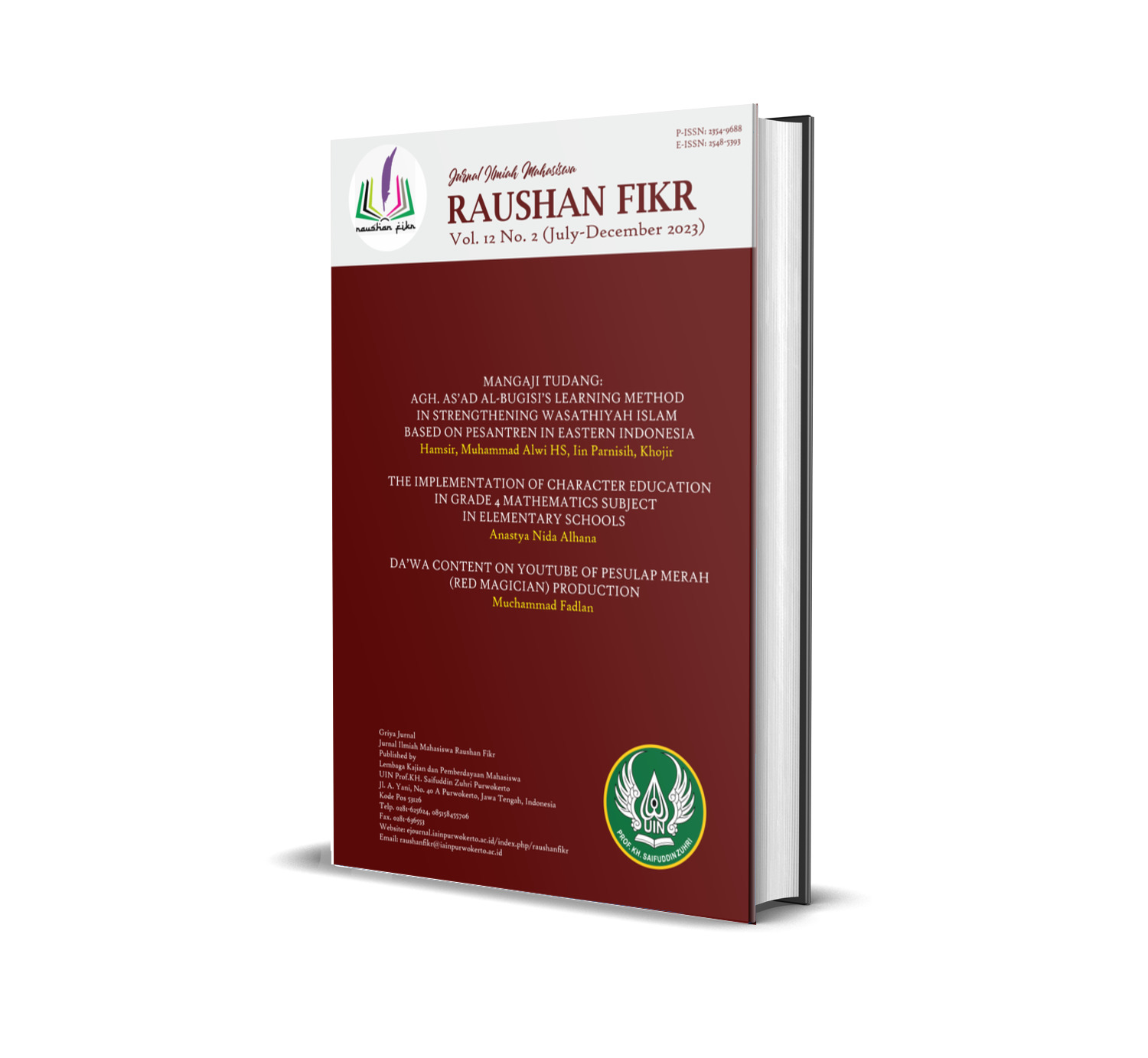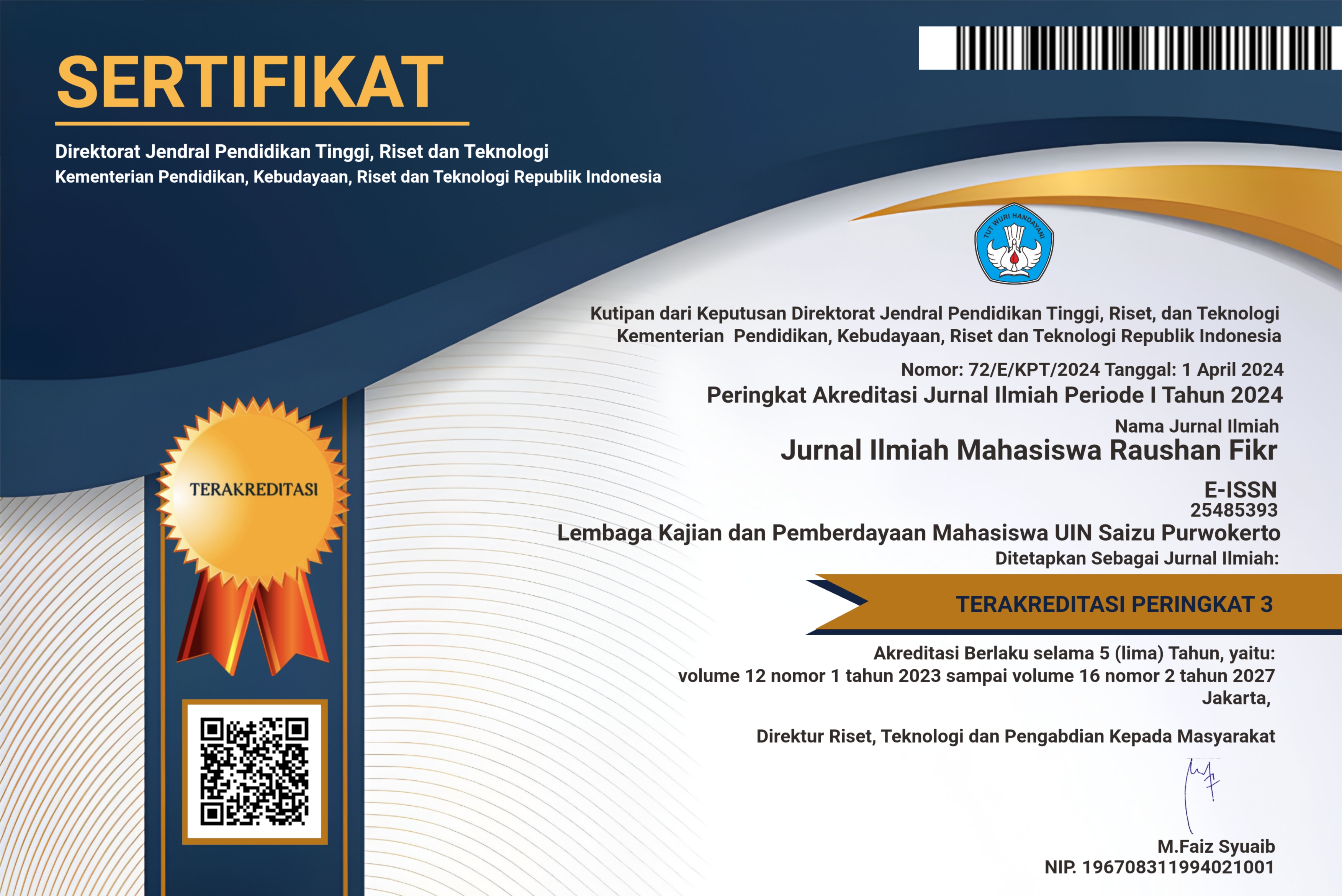The Dynamics of Maqasidi Interpretation in the Childfree Phenomenon: Controversy, Social Impact, and Contemporary Cultural Perspectives
DOI:
https://doi.org/10.24090/jimrf.v12i2.12332Keywords:
Childfree, Tafsir Maqasidi, Religious, Social and Cultural PerspectivesAbstract
The concept of childfree centers on the freedom to pursue personal life goals without the responsibility of raising children. Parenthood plays a significant role in determining one’s quality of life. This study explores the correlation between the interpretation of Maqasid al-Shariah and the childfree phenomenon from religious, social, and cultural perspectives. The research delves into the understanding of childfree through these lenses and employs the Maqasid al-Shariah interpretive approach for analysis. The methodology used in this research is qualitative, relying on a literature review approach (library research). The childfree phenomenon is often linked to the shift in modern values that emphasize individual autonomy, women’s rights over their own bodies, and economic considerations. In contemporary society, especially in urban areas, the decision to remain childfree is frequently viewed as part of a lifestyle that prioritizes career and personal achievements. Surah An-Nahl, verse 72, states that Allah created humans in pairs, from whom offspring are born. While this verse is pivotal, a maqasidi interpretation suggests that the decision to remain childfree should be considered within the broader context of individual well-being and circumstancesDownloads
References
Admin. (2022). Fenomena Childfree dan Prinsip Idealisme Keluarga Indonesia dalam Perspektif Mahasiswa. Lorong: Media Pengkajian Sosial Budaya, 11, 17–29.
Ana Rita Dahnia, Anis Wahda Fadilla Adsana, & Yohanna Meilani Putri. (2023). Fenomena Childfree Sebagai Budaya Masyarakat Kontemporer Indonesia Dari Perspektif Teori Feminis (Analisis Pengikut Media Sosial Childfree). Al Yazidiy: Jurnal Sosial Humaniora Dan Pendidikan, 5(1), 66–85.
Anwa, K., Awang, M. S., & Sahid, M. M. (2021). Maqasid Syariah According to Imam Al-Ghazali and Its Application in the Compilation of Islamic Law in Indonesia. Malaysian Journal of Syariah and Law, 9(2), 75–87.
Dalimunthe, S. W., Junaidi, & Is, F. (2024). Mental Health Pada Anak Broken Home Di Lingkungan Toxic Dalam Perspektif Al-Quran. Jurnal Ilmiah Mahasiswa Raushan Fikr, 13(1), 36–48.
Fadhilah, E. (2022). Childfree dalam perspektif psikologi islam. Al-Mawarid JURNAL SYARI`AH & HUKUM, 3, 71–80.
Fathnin, F., Purnowati, L., & Khasanah, P. (2024). Gambaran Tingkat Pengetahuan Masyarakat Tentang Fenomena Childfree, Pengetahuan Penggunaan Kontrasepsi Secara Sudut Pandang Islam. Indonesian Journal of Medical …, (Query date: 2024-10-02 15:38:40).
Febrianto, S., & Munawir. (2023). Living Hadis Living Hadis: Sebuah Metode Baru Memaknai Hadis Nabi Muhammad Saw Melalui Fenomena Sosial-Keagamaan Di Indonesia. Jurnal Ilmiah Mahasiswa Raushan Fikr, 12(1), 48–59.
Fikriya, K. N. (2023). Tujuan Pernikahan Dalam Al-Quran Dan Relevansinya Dengan Fenomena Childfree (Perspektif Tafsir Maqasidi) (Diploma, IAIN Ponorogo). IAIN Ponorogo.
Hawani, W., & Ilham, M. (2023). Telaah Maqashid Al-Syariah Fenomena Childfree Dalam Realitas Kehidupan Sosial. Indonesian Journal of Shariah and Justice, (Query date: 2024-10-02 15:38:40). Retrieved from http://ijsjiainternate.id/index.php/ijsj/article/view/71
Idris, I. (2020). Anak Sebagai Amanah Dari Allah. Musawa: Journal for Gender Studies, 11, 289–318. https://doi.org/10.24239/msw.v11i2.476
Implementasi, J., & Masyarakat, P. (2022). 3 1,2,3. 4(2017), 1–5.
Khadafi, M., & Azmi, M. (2024). Holistic Parenting Method from al-Qur’an Perspective: Strengthening Family Resilience in Facing the Dynamics of Modern Life.: Journal of Educational and Islamic Research, (Query date: 2024-10-02 15:38:40). Retrieved from https://jurnal.saniya.id/index.php/cigarskruie/article/view/191
Maula, L., & Yuzar, S. (2024). Tinjauan Tafsir Maqasidi terhadap Kisah Nabi Zakaria: Analisis Qs. Maryam [19]: 1-11. At-Tahfidz: Jurnal Ilmu Al-Qur’an Dan Tafsir, (Query date: 2024-10-02 15:38:40).
Munawarudin, A. (2023). Childfree dalam pandangan maqashid syariah. Jurnal Hukum Dan Hukum Islam Yustisi, 10(2), 119–137.
Munshihah, A., & Hidayat, M. R. (2022). Childfree in the Qur’an: An Analysis of Tafsir Maqashidi. Jurnal Ilmiah Mahasiswa Raushan Fikr, 11(2), 211–222.
Nabila, W., Jauza, H. A., Maryam, M., & ... (2024). A Feminist Study of the Childfree Trend in Generation Z: A Normative Review. … and Publication of …, (Query date: 2024-10-02 15:38:40).
Nabillah, A. S. (2024). The Quranic Response to The Childfree Phenomenon. International Journal of Islamicate Social Studies, 2(1), 25–36.
Prasmono, A. S. P., & Kartikasari, M. D. (2024). The Childfree Phenomenon in Indonesia: An Analysis of Sentiments on YouTube Video Comments. Jambura Journal of Mathematics, 6(1), 29–38. https://doi.org/10.37905/jjom.v6i1.23591
Ramadhan, A., Ramdani, R., & ... (2024). Conception of Qur’an as Self Healing to Inner Child in the Realization of Harmonious Family: Konsepsi Al-Qur’an sebagai Self Healing terhadap Inner Child dalam …. … Hadis Dan Tafsir, (Query date: 2024-10-02 15:38:40).
Rasyid, A., Jarudin, J., Saleh, I., & Lubis, R. F. (2024). Dynamics of Childless Marriage Through the Lens of Maqasid Al-Shari’a. Jurnal Ilmiah Peuradeun, 12(2), 763–786.
Rifa’i, M. N., Prasetiawati, E., & Mushodiq, M. A. (2024). Resistensi Al-Qur’an terhadap Prinsip Childfree Perspektif Tafsir Maqasidi. Jurnal Semiotika-Q: Kajian Ilmu al-Quran dan Tafsir, 4(2), 377–398.
Saputri, T. D. (2023). Pandangan Kyai Majelis Ulama Indonesia Kabupaten Pekalongan Tentang Perjanjian Childfree Dalam Perkawinan (Undergraduate_thesis, Universitas Islam Negeri K.H. Abdurrahman Wahid Pekalongan). Universitas Islam Negeri K.H. Abdurrahman Wahid Pekalongan.
Sihombing, M. (2023). Prosperous Life in the Qur’an: Analysis of Surah Quraish from the Viewpoint of Tafsir Maqashidi Abdul Mustaqim. Spiritus: Religious Studies and Education …, (Query date: 2024-10-02 15:38:40).
Siregar, D., Ladayya, F., Albaqi, N. Z., & Wardana, B. M. (2023). Penerapan Metode Support Vector Machines (SVM) dan Metode Naïve Bayes Classifier (NBC) dalam Analisis Sentimen Publik terhadap Konsep Child-free di Media Sosial Twitter. Jurnal Statistika Dan Aplikasinya, 7(1), 93–104.
Sodiq, N., & Huda, M. C. (2023). Understanding Childfree: A Phenomenological Perspective and Islamic Law. Journal of Islamic Studies and Civilization, 1(02), 201–225.
Stobert, S., & Kemeny, A. (2003). Childfree by choice Childfree by choice. Canadian Social Trends, 69(91), 7–11.
Surat An-Nahl Ayat 72. (n.d.).
Wilda Siti Hawani, Azuhria, & Ilham, M. (2023). Telaah Maqashid Al-Syari`Ah Fenomena Childfree Dalam Realitas Kehidupan Sosial. Indonesian Journal of Shariah and Justice, 3(2), 197–220.
Downloads
Published
How to Cite
Issue
Section
License
Copyright (c) 2023 Kayzan Nasution, Katimin

This work is licensed under a Creative Commons Attribution-NonCommercial-ShareAlike 4.0 International License.
Authors who publish with this journal agree to the following terms:
- Authors retain copyright and grant the journal right of first publication with the work simultaneously licensed under a Creative Commons Attribution-NonCommercial-ShareAlike 4.0 International License that allows others to share the work with an acknowledgement of the work's authorship and initial publication in this journal.
- Authors are able to enter into separate, additional contractual arrangements for the non-exclusive distribution of the journal's published version of the work (e.g., post it to an institutional repository or publish it in a book), with an acknowledgement of its initial publication in this journal.
- Authors are permitted and encouraged to post their work online (e.g., in institutional repositories or on their website) prior to and during the submission process, as it can lead to productive exchanges, as well as earlier and greater citation of published work (See The Effect of Open Access).
















